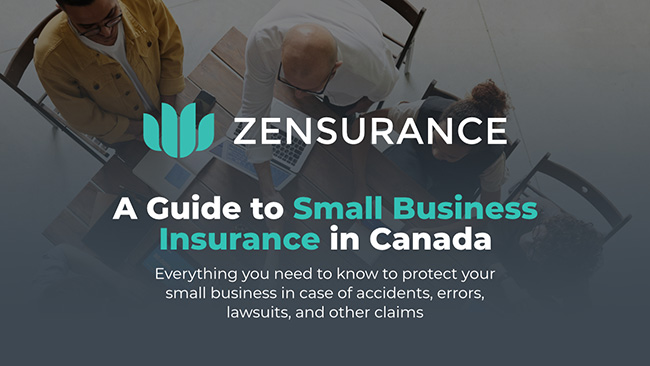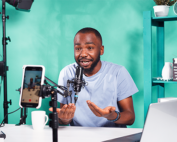Copywriters play a crucial role in crafting persuasive and engaging content for businesses.
However, their work comes with inherent risks that can lead to legal disputes, financial liabilities, and reputational damage. And in the age of generative artificial intelligence (AI) platforms, the stakes are heightened for copywriters who use AI tools like ChatGPT.
That’s all the more reason to protect your career and financial security with a customized professional liability insurance policy.
Understanding Professional Liability Insurance
Professional liability insurance, or errors and omissions (E&O) insurance, protects copywriters, freelance writers, authors, and other content producers from liability risks associated with their work.

Download Our FREE Insurance Guide
Learn everything you need to protect your small business.
Whitepaper download
"*" indicates required fields
Your email address will be used by Zensurance to provide latest news, offers and tips.
You can unsubscribe at any time.

Related Posts
Sign Up for ZenMail
"*" indicates required fields
Categories
It provides financial protection for legal defence costs and indemnity for damages in case of lawsuits or claims arising from alleged negligence, errors, or omissions in the performance of their jobs.
However, professional liability coverage is only one part of a comprehensive media liability insurance policy for copywriters. The customized policy you need depends on various factors, including the type of content you produce.
What Liability Risks Do Copywriters Face?
In many cases, a copywriter’s clients will require them to have a valid certificate of insurance, or they won’t hire them. That’s because the work copywriters do can result in several legal risks despite how cautious they are, such as:
- Intellectual Property Infringement: Copywriters must be cautious about using copyrighted material or trademarks without proper authorization. Inadvertently including protected content in their work can lead to legal complications and infringement claims.
- Defamation and Misrepresentation: Copywriters need to ensure that the claims they make in their copy are accurate and do not harm the reputation of individuals, companies, or products. False statements or misleading information can result in defamation claims.
- Plagiarism and Copyright Infringement: Copywriters must create original content and avoid using others’ work without proper attribution. Plagiarism violates ethical standards and exposes writers to copyright infringement claims.
- Contractual Obligations: Copywriters often work under contracts with clients, specifying project requirements, deadlines, and deliverables. Failure to meet these obligations can result in breach of contract claims, leading to financial liabilities and damage to professional relationships.
- Misuse of Confidential Information: Copywriters may have access to sensitive or confidential information about clients’ businesses. Mishandling or unauthorized disclosure of this information can lead to legal disputes and breaches of trust.
How Using AI Tools Can Pose Liability Risks for Copywriters
AI tools like ChatGPT are revolutionizing the copywriting landscape and introducing new risks and challenges.
For example, OpenAI, the company that created ChatGPT, is facing a lawsuit for defamation after a journalist using ChatGPT discovered it gave false information about a radio host stating the host is facing fraud and embezzlement accusations. Fortunately for the journalist, he did not publish the information, or he likely would also be named in that lawsuit.
In general, generative AI platforms can create legal threats for copywriters in many ways, including:
- Increased risk of plagiarism. AI-generated content presents challenges in ensuring originality. Copywriters using AI tools must be diligent in verifying the uniqueness of the output and review it thoroughly to avoid unintentional plagiarism.
- Misrepresentation and Inaccurate Claims. As the example above highlights, AI tools like ChatGPT may produce copy that includes misleading or inaccurate information. Copywriters are responsible for verifying the accuracy of AI-generated content before using it in their work.
- Legal and Ethical Considerations. Copywriters using AI tools must know compliance requirements, including regulations and disclosure obligations. They should ensure that AI-generated content adheres to legal standards and ethical guidelines to avoid liability.
Getting the Affordable Liability Insurance Coverage You Need
Explore your options for protecting your copywriting career and finances by filling out an online application for media liability insurance from Zensurance. It only takes a few minutes to do.
Our knowledgeable brokers will then shop our partner network of over 50 insurance providers to find the low-cost protection you need and tailor it to suit your concerns.
Related Posts
Our Top 10 Business Insurance Blog Articles in 2024
Read the 10 most-read blog articles on the Zensurance Small Business Insights blog in 2024 that captured the attention of Canadian business owners and entrepreneurs as you make plans to grow your business in 2025.
Insurance for Accountants: What to Do When Renewing Your Policy
It’s wise to think about what level of protection your accountancy or you as an independent accountant need. Here are nine things every accountant should consider when their policies are due for renewal.
Do I Need Errors and Omissions Insurance?
Every retailer selling online or online sellers using third-party marketplaces risks falling prey to fraud and cybercrime. During the busiest shopping season of the year, here are common scams to be wary of and the steps to take to protect your business.








